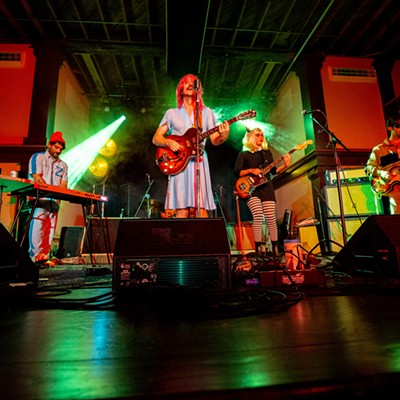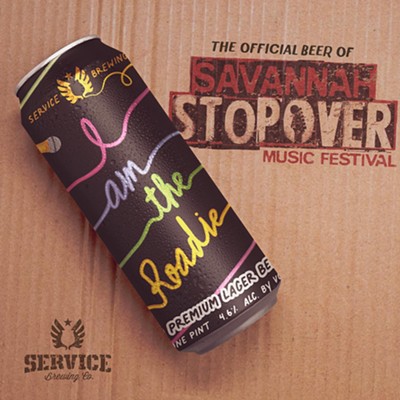IN THE 1990s, Eric Bachmann was howling through scrappy PA systems in living rooms in the middle of nowhere, shaking the floorboards with his Archers of Loaf bandmates.
A Bachmann house show circa 2018 is a starkly different affair. Nowadays, the revered indie rocker sits solo with an acoustic guitar in his lap and his small dog at his feet, unplugged and surrounded by small audiences of respectful fans.
“Playing solo, if you’re playing quietly without amplification, there are no excuses,” Bachmann says. “There’s no sound guy putting too many things on your voice and guitar.”
In his playing style, touring style, and life as a musician, that’s what Bachmann’s about these days: simplifying, streamlining, and getting to the heart of the matter.
“I got to the point where I wanted to be by myself,” he says. “I don’t want to sell t-shirts. I just want to play music and write songs. I feel so compelled by writing, I’ll never get it right—I’ll die not getting it right! The goal now, for me, is to write as well as I can. And that’s a lot.”
Chapel Hill-based Archers of Loaf brought an aggressive yet deeply melodic approach to mid-1990s indie rock. Noisy yet tender, sarcastic yet vulnerable, the band followed in the footsteps of their raw rock heroes the Replacements and Sonic Youth and gained a cult following in the process. With Bachmann on guitar and vocals, Eric Johnson on guitar, Matt Gentling on bass, and Mark Price on drums, the band cut the single “Wrong” in 1992, sharing their debut album Icky Mettle in 1993. That first record produced the single “Web In Front,” which became a college radio favorite and remains a deeply influential track (The Pitchfork 500 named the song one of the top 500 songs of recent decades in 2008).
The Archers followed Icky Mettle with Vee Vee, which produced the single “Harnessed in Slums.” 1996’s All the Nation’s Airports came next, distributed by Elektra Records. The band released their final album, White Trash Heroes, in 1998, and disbanded that year.
Following the Archers dissolution, Bachmann dove right into creating the solo project Crooked Fingers, a fluid musical entity with acoustic stylings and toned-down vocals than Archers fans may not have expected.
“A lot of the problems I was having were medical,” Bachmann shares. “I was having a real hard time with my throat because of the way I sang and treated my body in Archers. I cleaned up...and my voice was medically ruined, nodes all over my larynx and vocal cords. It was a real mess. You can hear it, listening to the first two Crooked Fingers records.”
He’s healed now, but the news made Bachmann completely change the way he sings. He found himself channeling some of his favorite vocalists like Lee Hazelwood and Neil Diamond.
“It was a little bit the rebel in me,” he says of quieting down for Crooked Fingers. “I knew it was anger, in a way. Now, I’m very grateful, but there’s something very progressive, aesthetically, about moving forward when you really change that appealed to me. I wanted to go in a direction people don’t expect you to. It was that rebellious satisfaction.”
From 2000 to 2011, Bachmann released six full-length albums of Crooked Fingers material. He was also finding work as a sideman, providing extra instrumentation for Superchunk, Band of Horses, the Poles, and Analog Moon on their tours (until the recent arrival of his first child, he was playing in Neko Case’s touring band, too).
In 2016, Bachmann released an album under his own name via Merge Records. He’s already working on a follow-up.
“Basically it’s me, my guitar, and my Moog,” he says. “It’s very ‘70s AM radio production, lots of vintage synths. Eric Johnson from Archers played electric guitar on it, my wife sang one song, it’s all electronic drums, Moog bass.”
He’ll play a variety of songs from across his career at his Savannah house show, adapting a lot of his catalog to the intimate environment.
“It’s about volume,” he says. “Being quiet and being loud, having a dynamic range to pull off in a way I’m satisfied with. Songs like ‘Harnessed in Slums,’ there’s a story in that song. I can pull it out of an acoustic guitar, and that, to me, is what dictates whether or not I can do it.”
































